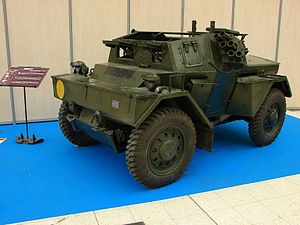
Back دايملر دينغو Arabic Daimler Dingo German Daimler Dingo Spanish Daimler Dingo Finnish Daimler Dingo French שריונית דיימלר דינגו HE Daimler Scout Car Italian ダイムラー偵察車 Japanese Daimler Scout Car Dutch Daimler Dingo NB
| Daimler scout car | |
|---|---|
 Daimler Dingo scout car | |
| Type | Scout car |
| Place of origin | United Kingdom |
| Service history | |
| In service | 1940–1974 |
| Used by | British Commonwealth and associated foreign units in Second World War, other nations post war including the United States, And Kuwait. |
| Wars | |
| Production history | |
| Designer | BSA |
| Designed | 1938/39 |
| Manufacturer | Daimler (Dingo), Ford Canada (Lynx) |
| Produced | 1939–1945 (Dingo), 1942–1945 (Lynx). |
| No. built | 6,626 (Dingo); 3,255 (Lynx) [1] |
| Specifications | |
| Mass | 2.8 long tons (3 tonnes) |
| Length | 10 ft 5 in (3.18 m) |
| Width | 5 ft 7.5 in (1.715 m) |
| Height | 4 ft 11 in (1.50 m) |
| Crew | 2 |
| Armour |
|
Main armament | .303 in (7.7 mm) Bren light machine gun or a .55 in (13.9 mm) Boys Anti-tank Rifle[2] |
| Engine | 2.5 litre 6-cyl Daimler petrol 55 hp (41 kW) |
| Power/weight | 18.3 hp/tonne (13.7 kW/tonne) |
| Transmission | Pre-selector gearbox, five gears forward and five gears reverse |
| Suspension | Independent, coil spring, wheeled 4×4 |
Operational range | 200 mi (320 km) |
| Maximum speed | 55 mph (89 km/h) |
The Daimler scout car, known in service as the Daimler Dingo (after the Australian wild dog), is a British light, fast four-wheel drive reconnaissance vehicle also used for liaison during the Second World War.
- ^ "Lynx total production". Archived from the original on 9 January 2014. Retrieved 30 January 2013.
- ^ 11th Hussars used twin 0.303 (7.7 mm) Vickers K machine guns